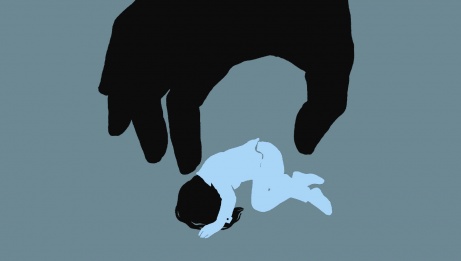

Safia Nolin
Safia Nolin sees herself as a political being through her battles, the topics she tackles and her appearance. As she, a racialized and openly lesbian woman, is perceived as deformed because she doesn’t fit the feminine patterns we’ve been taught for centuries, she’d rather embrace that dissonant image rather than matching damaging ideals by being someone she’s not. This is how Seum is an accomplished piece of work that fully defines its author. Safia Nolin is an artist and a person shedding her skin and celebrating this transition doing what she does best, by honoring all sorts of pain.
While she’s tuning her guitar during an interlude onstage, Safia Nolin tells the audience about her day with a lot of humor before introducing the next song as even more depressing than the previous one. As her first two albums (Limoilou, 2015 and Dans le noir, 2018) predicted it, the Seum EP that Safia Nolin released in 2021 was never going to be an optimistic piece of work. However, just like any other painful musical creation, Seum is a record that thrives on mourning a few things from the past and taming one’s demons. Although Safia remembers conceiving all eight tracks from the EP with a deep feeling of injustice, she now finds herself soothed, playing it live in Quebec as well as in France.
Safia herself set herself up as the art director of her latest single, the ballad “Carrie” that she sings in English. She not only is a singer-songwriter, she now chooses to go completely DIY by crafting the imagery accompanying her music.
Moreover, lately she’s gone entirely independent as an artist, freeing herself from any label company. Better off without anyone but herself on that new path she’s building on her own, she recorded most of the four tracks from Seum outside, each of them in a melancholic version called sunrise and in a happier version, sunset.
Her recent passion for crochet now adds to the softness of her voice and the roughness of her feelings. Crochet goes beyond a simple pastime as it allows Safia to express once more her duality, shunt from her cheerful and kind personality to a genuine sorrow she exorcizes through music. The pieces of clothing (hats, sweaters, gaiters, etc.) that she crafts display explosive and eccentric colors that contrast with long threads she intentionally lets hang from the rest, showing her attachment to her ideal of deformity.
To dream of one’s death can be scary at first, but it so happens that it means saying goodbye to a piece of oneself, as if one’s mind simply realized it was making a fresh start all along. Safia Nolin’s songs may be dark on every level, yet still it is by burying a former part of herself as shown on her latest EP’s cover that she delivers an authentic record with her own particular kind of pop music. Deliberately thundering and dirty, her guitar goes perfectly with Safia’s clear, calming voice. Agathe Dupere (bass), Marc-André Labelle (guitar) and Jean-Philippe Levac (drums) accompany the artist laying out what she finds herself in the most: the raw imperfection of the moment.
